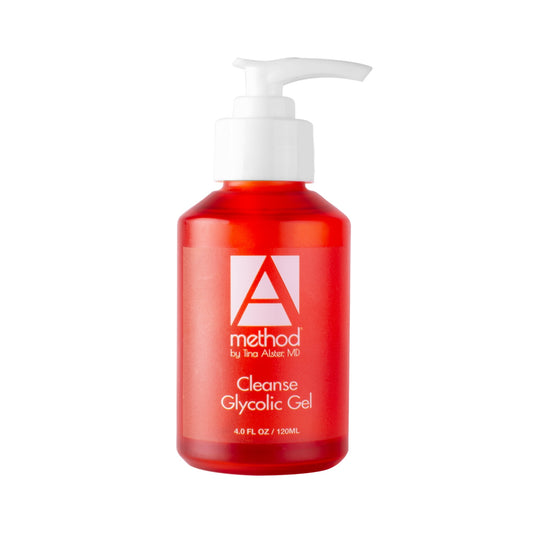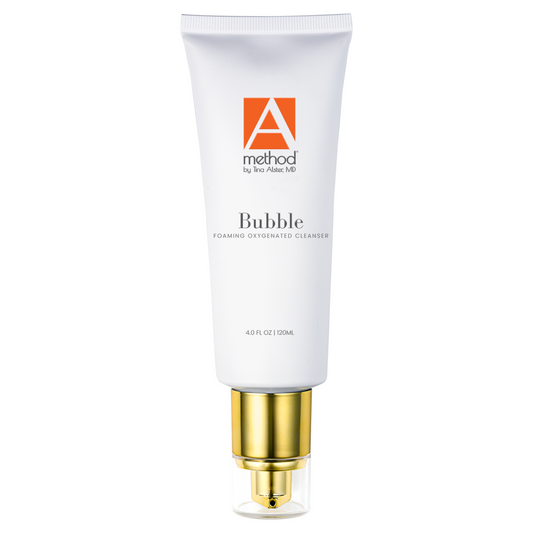

Browse Skincare Products by The A Method
All the essentials for every skincare routine.
Antioxidant and Facial Cleansers
Tired of facial cleansers that dry out your skin? The A Method cleansers remove impurities without stripping away moisture, keeping skin hydrated – naturally!
What does a facial cleanser do?
Facial cleansers help remove makeup, oil, dirt, and impurities from the skin surface. They keep pores clear, reduce the likelihood of breakouts, and prepare skin for subsequent skincare steps like toners, serums, and moisturizers.
Unlike some face washes, cleansers provide a gentle yet effective purification of the skin, helping maintain barrier health without stripping essential moisture and leaving skin feeling tight.
Which facial cleanser is best?
The best facial cleanser depends on your skin type and specific needs.
For example, glycolic cleansers work well for exfoliating and brightening, but they are typically best used 2-3 times a week to avoid over-exfoliation, especially for sensitive skin. Antioxidant cleansers provide added protection against free radicals, leaving skin not only clean, refreshed, and comfortable – but also shielded from negative environmental factors like sun and pollution.
If you have oily skin, look for an oil-free daily cleanser to control shine without drying out your skin. For dry or sensitive skin, a cleanser with hyaluronic acid or aloe vera can help maintain the skin's natural moisture barrier, keeping it feeling super soft.
What is the difference between facial cleanser vs. facial wash vs. foaming wash?
A facial cleanser typically has a gentler, more hydrating formula, making it suitable for daily use. Facial cleansers are often available in various forms, such as creams, gels, or oils. They also work well for various skin types, including normal, dry, combination, and sensitive skin.
A face wash, meanwhile, often has a foaming texture that creates a rich lather for a deeper cleanse. However, this deep-cleansing action can sometimes be drying, particularly for sensitive or dry skin, which is why face washes are usually best for those with oily or pimple-prone skin. Note that "facial wash" is a broader term that can include both foaming and non-foaming formulas.
A foaming wash is a type of facial wash that produces a rich, airy foam when mixed with water. This foam lifts away excess oil and impurities for a thorough cleanse.
Are facial cleansers for daily use?
Most facial cleansers are formulated for daily use. They are gentle enough to cleanse your skin without causing irritation or dryness. Many people use them twice daily—morning and night—as part of their skincare routine.
What is an antioxidant cleanser?
An antioxidant cleanser contains ingredients like vitamins C and E that help protect the skin from environmental stressors and free radicals. This type of cleanser can brighten the skin and combat early signs of aging while cleansing away impurities.
What is a glycolic cleanser?
A glycolic cleanser is a type of facial cleanser formulated with glycolic acid, an alpha hydroxy acid (AHA) derived from sugarcane. Glycolic acid gently exfoliates the skin, removing dead skin cells and promoting cell turnover. This helps smooth skin’s texture, brighten complexion, and improve the appearance of fine lines – making glycolic cleansers especially popular for those with dull, uneven skin or mild skin discoloration.
However, glycolic cleansers are best used 2-3 times a week to avoid over-exfoliating the skin, especially in sensitive skin types.
Are vitamin C cleansers effective?
Yes, vitamin C cleansers can be very beneficial for your skin. Vitamin C is a potent antioxidant that helps naturally brighten complexion, even out skin tone, and shield it from environmental stressors like pollution and UV rays.
When used in a cleanser, vitamin C is delivered at a surface level while skin is gently purified for enhanced brightening benefits when it comes to skin tone – an excellent option for those looking to achieve a more radiant and glowing complexion.
What does a foaming cleanser do?
A foaming cleanser lathers up to create a rich foam, effectively removing excess oil, makeup, and dirt from the skin. It’s particularly beneficial for those with oily or combination skin. The foaming action can provide a refreshing, deep-clean feel, but it may be drying for some skin types, especially if the formula contains harsh surfactants.
Here's a breakdown of how a foaming facial cleanser works:
- Dispensing the cleanser: When you dispense a foaming cleanser, it comes out as a lightweight liquid or foam that spreads easily over the skin.
- Lifting impurities: As you gently massage the foam onto your skin, it lifts away dirt, excess oil, makeup, and other impurities from the surface, reaching deep into the pores.
- Emulsifying oil: The foaming action helps break down oils, making them easier to rinse away.
- Rinsing off: Rinsing with water washes away the foam and impurities, leaving your skin feeling fresh and clean.
- Leaving a refreshed feel: The result is a balanced, clean skin without feeling overly tight – making foaming cleansers ideal for managing oil and shine for sensitive skin types compared to glycolic washes.
The terms "foaming cleanser" and "foaming wash" are often used interchangeably, as both refer to a cleanser that creates a lather or foam when applied to the skin. However, there can be subtle differences depending on the brand or formulation. In particular, "foaming cleanser" implies a gentler formula that's suitable even for sensitive skin, while "foaming wash" sometimes suggests more robust cleaning.
Why do some people avoid foaming cleansers?
Some people avoid foaming cleansers because they can be drying, especially if they contain sulfates or harsh surfactants. If you have dry or sensitive skin, a non-foaming, hydrating cleanser may be a better option.
Are foaming cleansers good for clogged pores?
Yes, foaming cleansers can be great for clogged pores. They deeply cleanse the skin, removing excess oil, makeup, and debris that may block the pores.
However, it's important to look for foaming cleansers with ingredients that won't strip your skin of its natural oils, such as salicylic acid. Also, remember not to over-cleanse, as this can irritate the skin and lead to increased oil production.
Which face cleanser for oily skin is recommended by dermatologists?
For oily skin, dermatologists often recommend face cleansers that can control excess oil without disrupting the skin’s moisture balance. Some of the most commonly recommended options include:
Gel-based cleansers
These are often lightweight and help remove excess oil. They work well for oily skin by cleansing deeply without leaving a residue.
Salicylic acid
Salicylic acid is a beta hydroxy acid (BHA) that can penetrate oily pores, helping reduce excess oil and prevent pimples. It’s especially helpful for those prone to breakouts.
Benzoyl peroxide
Benzoyl peroxide has antibacterial properties, making it effective against pimple-causing bacteria. A cleanser with a low concentration (e.g., 2.5-5%) can be a good choice for oily, pimple-prone skin.
Glycolic acid
For those looking to exfoliate, glycolic acid can help by removing dead skin cells and balancing oil production. These work well for those with oily skin and uneven texture.
Foaming cleansers
Dermatologists often recommend gentle foaming cleansers for oily skin, as these can remove excess oil without being too harsh. Look for sulfate-free options to avoid over-drying.
-
Cleanse Glycolic Gel
Glycolic Gel Cleanser
Regular price $35.00 USDRegular priceUnit price / per5.0 / 5.0
(1) 1 total reviews
-
Bubble Foaming Oxygenating Cleanser
Foaming Oxygenated Cleanser
Regular price $42.00 USDRegular priceUnit price / per


